Japanese Ways
Tokyo, September 21st.1890
About seven or eight years ago an interesting story was told in English astronomical society, having reference to that which is known among the initiated by the name of "personal equation."
Owing to some properties of eye, ear, and brain, peculiar to individuals, it is generally found that with any two observers, however expert, the exact times of their respectively noting the same phenomenon - as, for example, that of a star's passage across the wire of a transit instrument - will differ from one another by a constant or nearly constant quantity, often several tenths of a second, while both will differ from the truth.
The latter difference for any individual, at any epoch of his life, is his personal equation, that is to say, his habitual error, plus or minus, in observing such or such a phenomenon.
Sometimes a man may be found who has no personal equation; and this rare quality is more easily and certainly detected nowadays than it used to be.
Formerly it was assigned to the observer, if any, who among a large group was found to be the mean of them all - an award which might or might not be quite correct.
Of late years the use of an articial star, made to record its actual transit times by electricity, for comparison with the times recorded by the observer, affords a much more positive means of identifing the man with no personal equation for star transits.
To come now to the story.
A party of observers was about to be sent on some astronomical service in the southern hemisphere.
Their personal equations had been carefully ascertained in the usual way, when it occurred to those responsible that as, in the hemisphere to which they were going, the apparent directions of the celestial movements would be reversed - so that, for example, stars near the equator would advance from right to left instead of from left to right - their equations ought to be reinvestigated for stars moving, so to speak, the wrong way.
This was done, with the result, not unexpected, that there were large differences between the new and the former figures.
There was, however, one exception-in a mysterious individual to whom it mattered not which way the stars moved, and who had no personal equation in either case.
The professors were sorely vexed about this very peculiar being, until at length the key to the riddle was found by the discovery that he was ambidexterous.
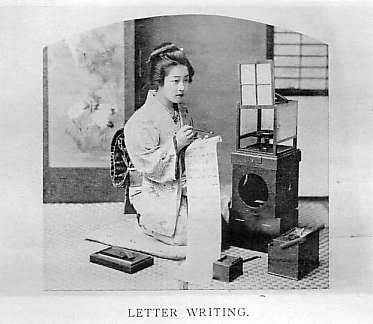
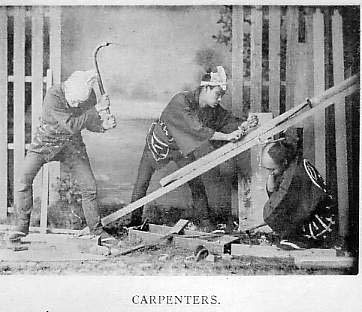
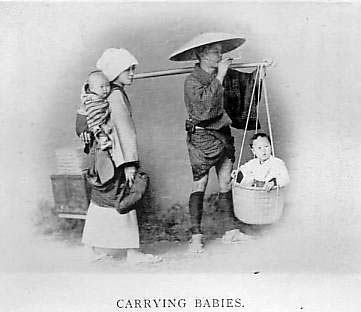 It might be a curious subject for inquiry whether, as there are personal equations among star observers, so there may be personal equations among nations - equations appertaining, that is to say, to the everyday ways of doing the same everyday thing which prevail among the world's different peoples, as the result, not of the special circumstances under which they live or have lived, but of independent mental bent.
If such an investigation should be now undertaken, it is certain that the personal equation of the Japanese vis-a-vis the Western and, indeed, all other races would be found to be a very appreciable quantity.
Japanese ways are in many respects unique.
It is not necessary to put absolute faith in the legend that when the waitors of Dai Nippon first made the acquaintance of bottles and corkscrews, they were wont to twist the bottle on to the corkscrew instead of screwing the corkscrew into the cork.
Nevertheless, you may see to this day, at almost any out-of-the-way country inn, a tendency in that direction which seems to lend some truth to the story.
The little handmaid who puzzles over the problem of uncorking your claret or whisky has an evident leaning, until corrected, to solve it with the bottle.
When your cook bakes a cake in an ordinary cake tin, it is as certain that, if left to himself, he will serve it bottom upwards, and bottom sugared withal, as it is that the butler will open your tins of jam or pate at the bottom instead of at the top.
Japanese books begin at what we call the end.
The lines are vertical instead of horizontal, the first being on the right hand edge of the page, and are read downwards from the top.
The place for "foot-notes" is at the top of the page, and that for the reader's marker at the bottom.
Letter writing, like book printing, advances by vertical lines from right to left, and is always on one side of one strip of paper, which is unwound from a roll as the writer proceeds, and cut off where he finishes.
To fold the letter, it is doubled over and over from one end of the strip to the other.
The postage stamp is affixed on the closed seal flap of the envelope, instead of on its face.
As for the mode of address, it is the exact reverse of ours.
Thus, "England, London, Printing House Square, The Times Office, The Editor," would be the Japanese way of directing this letter.
People in Japan are called by the family name first, the individual, or what we should call Christian, name next, and then the honorific.
"Mr. Peter Smith" is in this country "Smith Peter Mr."
The carpenter planes and saws towards instead of from him - the wrong way as we should say, yet his feats of planing are extraordinary.
Japanese screws are left handed, and Japanese locks work "the wrong way."
At games of cards the dealer deals to the right, and the play goes round in the same direction.
When travelling you fee the hotel servants soon after your arrival, instead of at departure.
Arrows are launched from the left side of the bow.
Babies are carried on the back instead of in the arms.
Candles are blown out with the hand or a fan, instead of by the breath.
The bookkeeper enters his money figures first, his items below them.
In place of the hot food and cold drinks in which we indulge at our dinners and luncheons, the Japanese lean to cold food and hot drinks.
Sweets make their appearance early in the repast.
Your host takes the lowest place.
Crests are worn on the clothing, instead of being graven or painted on the household goods.
Horses are mounted from the right side, where also are all the harness fastenings.
The mane is trained over the left side.
In the stable the horse looks outward from his stall, and is fed from a bucket instead of a manger.
The sail cloths in Japanese craft are vertical instead of horizontal, and laced instead of sewn.
When it is necessary to reef, the sail is reduced laterally by unlacing one or more breadths, instead of in its vertical dimension, as is the custom everywhere else.
Strange, too, in other respects are the ways of Japanese boatmen.
They tow their boats stern foremost, and also haul them up stern foremost on the beach.
In cold weather, even though on their muscular and splendidly-shaped bodies there be hardly enough clothing to swear by, you may at least be sure of their taking infinite pains to wrap up, of all features, their noses.
In house-building the roof is the first part constructed, only to be taken to pieces again until the sub-structures is ready for it;, and the best rooms, as well as the garden, are commonly at the back instead of at the front.
It might be a curious subject for inquiry whether, as there are personal equations among star observers, so there may be personal equations among nations - equations appertaining, that is to say, to the everyday ways of doing the same everyday thing which prevail among the world's different peoples, as the result, not of the special circumstances under which they live or have lived, but of independent mental bent.
If such an investigation should be now undertaken, it is certain that the personal equation of the Japanese vis-a-vis the Western and, indeed, all other races would be found to be a very appreciable quantity.
Japanese ways are in many respects unique.
It is not necessary to put absolute faith in the legend that when the waitors of Dai Nippon first made the acquaintance of bottles and corkscrews, they were wont to twist the bottle on to the corkscrew instead of screwing the corkscrew into the cork.
Nevertheless, you may see to this day, at almost any out-of-the-way country inn, a tendency in that direction which seems to lend some truth to the story.
The little handmaid who puzzles over the problem of uncorking your claret or whisky has an evident leaning, until corrected, to solve it with the bottle.
When your cook bakes a cake in an ordinary cake tin, it is as certain that, if left to himself, he will serve it bottom upwards, and bottom sugared withal, as it is that the butler will open your tins of jam or pate at the bottom instead of at the top.
Japanese books begin at what we call the end.
The lines are vertical instead of horizontal, the first being on the right hand edge of the page, and are read downwards from the top.
The place for "foot-notes" is at the top of the page, and that for the reader's marker at the bottom.
Letter writing, like book printing, advances by vertical lines from right to left, and is always on one side of one strip of paper, which is unwound from a roll as the writer proceeds, and cut off where he finishes.
To fold the letter, it is doubled over and over from one end of the strip to the other.
The postage stamp is affixed on the closed seal flap of the envelope, instead of on its face.
As for the mode of address, it is the exact reverse of ours.
Thus, "England, London, Printing House Square, The Times Office, The Editor," would be the Japanese way of directing this letter.
People in Japan are called by the family name first, the individual, or what we should call Christian, name next, and then the honorific.
"Mr. Peter Smith" is in this country "Smith Peter Mr."
The carpenter planes and saws towards instead of from him - the wrong way as we should say, yet his feats of planing are extraordinary.
Japanese screws are left handed, and Japanese locks work "the wrong way."
At games of cards the dealer deals to the right, and the play goes round in the same direction.
When travelling you fee the hotel servants soon after your arrival, instead of at departure.
Arrows are launched from the left side of the bow.
Babies are carried on the back instead of in the arms.
Candles are blown out with the hand or a fan, instead of by the breath.
The bookkeeper enters his money figures first, his items below them.
In place of the hot food and cold drinks in which we indulge at our dinners and luncheons, the Japanese lean to cold food and hot drinks.
Sweets make their appearance early in the repast.
Your host takes the lowest place.
Crests are worn on the clothing, instead of being graven or painted on the household goods.
Horses are mounted from the right side, where also are all the harness fastenings.
The mane is trained over the left side.
In the stable the horse looks outward from his stall, and is fed from a bucket instead of a manger.
The sail cloths in Japanese craft are vertical instead of horizontal, and laced instead of sewn.
When it is necessary to reef, the sail is reduced laterally by unlacing one or more breadths, instead of in its vertical dimension, as is the custom everywhere else.
Strange, too, in other respects are the ways of Japanese boatmen.
They tow their boats stern foremost, and also haul them up stern foremost on the beach.
In cold weather, even though on their muscular and splendidly-shaped bodies there be hardly enough clothing to swear by, you may at least be sure of their taking infinite pains to wrap up, of all features, their noses.
In house-building the roof is the first part constructed, only to be taken to pieces again until the sub-structures is ready for it;, and the best rooms, as well as the garden, are commonly at the back instead of at the front.
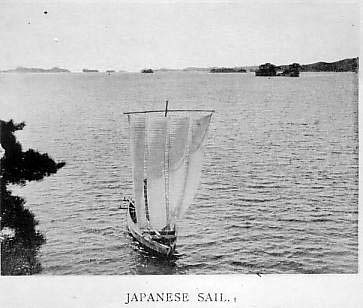
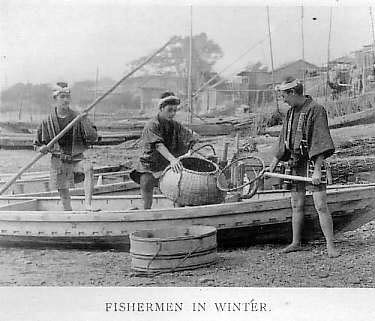
Less pronounced than the foregoing as evidence of "personal equation" are many other Japanese habits and ways which may be said to amount to peculiarities from the Western point of view.
Japanese bathe, for example, in the afternoon or evening, instead of at rising as we do.
Our lower orders it is to be feared, pay more attention to the cleanliness of their clothes than of their bodies.
The reverse is the case with the lower orders of the Japanese - the most scrupulous bathers under the sun, even though their garments, in winter especially, be quite unworthy of their clean, pumice-stoned bodies.
Porcelain abounds in Japan, yet food is for the most part served in polished lacquer vessels, as easily kept clean and much less easily broken.
There are seven ranks of chess-players, and of these the first is the worst, a method of enumeration, however, which has its parallel in the forms and classes of our public schools.
Small children of the poor, who have the gift of straying and no nurses to look after them, are safeguarded by the simple precaution of hanging labels round their necks which tell their names and addresses.
A Japanese is said to be one year old on the last day of the year in which he is born; two years old on the very next day, i.e., the first day of the new year; three years old on the succeeding New Year's Day; and so on.
Hence we find the curious anomaly that a child born on the 31st of December is two years old the day after its birth.
In other respects also Japanese count of time differs from ours.
From Tuesday to Friday, for example, is called four days intead of three, and year periods are similarly spoken of.
Unlike the Western householder, who crams his saloons with all the art-objects he possesses, too often giving them the aspect of veritable show-rooms, the Japanese gentleman keeps the bulk of his treasures in a fireproof store-house, taking out a few only-one or two for each room - at a time, and giving them place in the tokonoma, or raised recess, which is the place of honour in the apartment.
There, for a week, or may be a month, he dwells on their beauties with the undivided attention they deserve, and only replaces them by others when he has fairly gazed his fill.
For pocket handkerchiefs the Japanese use little squares of clean paper, a bundle of which is carried in the girdle.
Paper, again, takes the place of string, as you find out when the shopman ties togetgher your purchases with a binding deftly rolled up from a strip of paper before your eyes.
Paper also is commonly used for window panes in Japan, alone of all countries in the world.
As for Japanese beckoning, it is one of those things that "no fellow can understand" - at least, until he has had some experience - so much does the gesture resemble a warning to be off, instead of an invitation to advance.
Two jinrikishas are approaching one another at speed.
One of the men waves his hand to the right or left, and you take it as his signal of the course which the other is to follow.
But you are in Japan, where it means, instead, the side he himself intends to take.
Lastly, who of us that live here has not had experience of what I have heard described as the Japanese habit of saying Yes when they ought to say No?
You ask your guest, "Will you not take some more wine? or say to your friend in the street, interrogatively, "I suppose there will be no more rain today?"
In both cases he answers in the affirmative.
He will not take more wine, and he agrees with you about the weather prospects.
The Englishman, in both cases, would say No.
The question is, Which is correct?
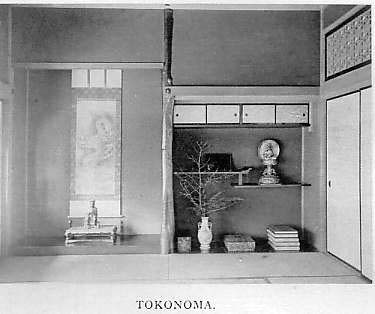
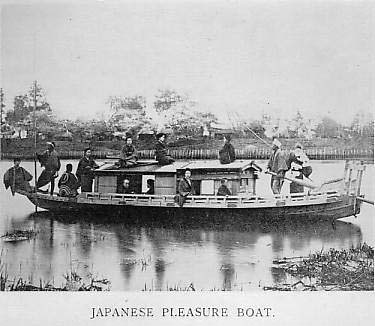
That, too, is the question which suggests itself in respect of many of the idiosyncracies here grouped together under the name of Japanese ways.
In the difficulty of answering it, one is tempted to wish that there were some standard nation, like the ambidexterous man of the story, from which, as a datum, the personal equations of the rest might be ascertained.
It might then be possible to establish conclusively that certain things ought to be done only in certain ways, and to say - what no one can say now - who is right and who wrong.
The foundations of the Western faith in such matters are rudely shaken by what we see and know of the Japanese.
Accustomed to our own ways, we are apt to speak lightly of Japanese ways as wrong.
But the Japanese say the very same about us.
As Mr. Chamberlain tells us in the interesting book entitled "Things Japanese", which he has lately published, many of our ways are the ways of topsy-turvydom in the eyes of this country's people.
In what respects, among those here cited, we or they have the better of the argument each reader of The Times may judge for himself from the foregoing epitome of the most conspicuous of their so-called peculiarities.
Possibly some scientist of the future may succeed in throwing light on the subject, and be able to find out the causes of differences which are too great and invariable to be the results of mere accident.
The Times - Nov. 22nd.
Going Back to Article List
